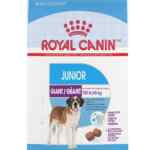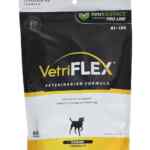Welcome to our St Bernard nutrition guide. St. Bernard dogs are known for their impressive size and gentle nature. As gentle giants, they require a carefully planned diet to ensure they maintain good health and proper weight throughout their lives. Nutrition plays a crucial role in supporting their robust skeletal structure, maintaining their thick coat, and sustaining their energy levels.
A St. Bernard’s diet typically includes high-quality commercial dog food or well-balanced home-cooked meals that are rich in proteins, carbohydrates, fats, vitamins, and minerals. It’s important to select food appropriate for large-breed dogs, as it will be formulated to support joint health and prevent excessive weight gain, which can be detrimental to the breed’s health.
Puppies of this breed have specific dietary requirements to support their rapid growth and development. St. Bernard puppies should be fed more frequently with smaller portions to avoid overloading their digestive system and to prevent issues such as bloat, which can be life-threatening. Puppy food for large breeds contains the right balance of calcium and phosphorus to promote strong bone growth and to prevent the onset of skeletal disorders such as hip dysplasia.
As they transition from puppyhood to adulthood, their caloric intake should be adjusted accordingly to prevent obesity, as St. Bernards can be prone to weight gain due to their size and sometimes sedentary lifestyle.
For adult and senior St. Bernards, maintaining an ideal weight is essential for minimizing stress on joints and the heart. As these dogs age, they may become less active, and their metabolic rate may slow down. Thus, their diets may need to be adjusted to ensure they are not consuming excess calories that can lead to obesity.
Incorporating sources of omega-3 fatty acids can help maintain their thick, lustrous coat and also support joint health. Regular veterinary check-ups are important to monitor their overall health and to make dietary adjustments as needed. In summary, a balanced diet tailored to their life stage, activity level, and individual health needs is paramount for keeping a St. Bernard healthy and happy.
Top 5 Recommended Commercial Dog Food Brands for St Bernard Dogs
When choosing commercial dog food for St. Bernard dogs, it’s important to look for brands that cater to large breed nutritional needs, including joint support, balanced calories for controlled growth, and appropriate levels of protein and fat. Here is a list of top 5 recommended commercial dog food brands for St. Bernard dogs, but remember to consult with a veterinarian before making any diet changes.
 1. Royal Canin
1. Royal Canin
– Offers breed-specific formulas such as ‘Royal Canin Giant Adult‘ tailored to the needs of very large breeds like St. Bernards, focusing on heart health and adapted energy content.
2. Purina Pro Plan
– Provides a variety of formulas such as ‘Purina Pro Plan Large Breed’ with targeted nutrition for large breeds, including joint health and muscle mass maintenance.
3. Hill’s Science Diet
– Known for its ‘Large Breed‘ line which includes scientifically-formulated nutrition to support the health and energy needs of large breed dogs like St. Bernards.
4. Eukanuba
– Offers ‘Large Breed’ specific dog food which is designed to provide optimal nutrition for larger dogs, with a focus on joint support and maintaining a healthy weight.
5. Blue Buffalo
– Provides ‘Blue Life Protection Formula Large Breed Adult‘ recipes which are made with natural ingredients and enhanced with vitamins and minerals, formulated to support the health and well-being of large breed dogs.
Always ensure that any diet change is gradual to avoid gastrointestinal upset, and that the diet you choose suits the age, weight, and activity level of your St. Bernard. Nutritional needs will vary for puppies, adults, and senior dogs.
Recommended St Bernard Feeding Schedule and Portion Sizes
Establishing a recommended feeding schedule for a St. Bernard involves understanding their growth stages, activity levels, and potential health issues. For puppies, it’s common to feed them three to four times a day to support their rapid growth and high energy demands. As they transition into adulthood around 18 months, their feeding frequency should be adjusted to twice a day to help prevent bloating, a common health issue in large breeds. It’s important to provide meals at consistent times each day to establish a routine and help with digestion.
Portion sizes for St. Bernards vary significantly throughout their lives. Puppies may consume up to 2-3 cups of puppy-formulated dry food per meal, depending on their age and growth rate. As they grow into adults, their portion sizes will increase, and it’s not uncommon for an adult St. Bernard to require anywhere from 5-6 cups of adult-formulated dry food per day, split between their two meals.
However, these portions must be tailored to the dog’s specific size, age, activity level, and health condition. Overfeeding can lead to obesity, which can exacerbate health issues such as hip dysplasia, a condition to which St. Bernards are predisposed.
In conjunction with a feeding schedule and appropriate portion sizes, the quality of food is paramount. High-quality, nutrient-dense food formulated for large breeds should be selected to ensure that St. Bernards receive the right balance of proteins, fats, carbohydrates, vitamins, and minerals necessary for their health.
 Supplements can be considered if recommended by a veterinarian, especially for joint support due to the breed’s susceptibility to joint issues.
Supplements can be considered if recommended by a veterinarian, especially for joint support due to the breed’s susceptibility to joint issues.
Always have fresh water available, and monitor the dog’s weight and body condition closely, making adjustments to their diet as necessary. Regular check-ups with a veterinarian will help ensure that the St. Bernard’s nutritional needs are being met and that they maintain a healthy weight throughout their life.
*Always check with your veterinarian to ensure that the manner in which you are feeding your St Bernard is right for your dog’s specific requirements based on size, age and health status.
